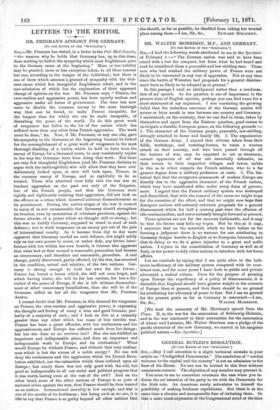MR,. WALTER MORRISON, M.P., AND GERMANY.
[TO THE EDITOR OF THE " SPECTATOR.") SIR,—I find the following words attributed to me in the Spectator of February 4 :—" The German nation was said to have been seized with a lust for conquest, but from what he had heard and read he considered them a peaceable and law-abiding race. Those men who had crushed the military power of France were not likely to be interested in any war of aggression. Not at any time since the battle of Waterloo had proposals for a general disarma- ment been so likely to be adopted as at present."
In this passage I read an abridgment rather than a condensa- tion of my speech. As the question is one of importance in the present state of English opinion, perhaps you can find room for a short statement of my argument. I was combating the growing belief that the unbroken successes of the German armies will sooner or later result in war between our country and Germany. I maintained, on the contrary, that we can find in them, taken by themselves and apart from the Eastern question, good reason to anticipate a durable European peace, on the following grounds :- 1. The character of the German people, peaceable, law-abiding, strongly attached to home and family life. 2. The organization of the German Army. I argued that citizens taken from their fields, workshops, and counting-houses, to resist a wanton attack on their country, and who have passed through all the horrors of war, may be expected to act as strenuous, earnest opponents of all war not essentially defensive, on their return to their respective villages and towns, unlike in this as in other respects the French soldiers, who to a far greater degree form a military profession or caste. 3. The his- torical fact that the overgrown armaments of modern Europe are directly due to the aggressive character of the French nation, which they have manifested alike under every form of govern- ment. I argued that the French military system was destroyed and discredited, that with the removal of the cause we might hope for the cessation of the effect, and that we might now hope that European nations will seriously entertain proposals for a general disarmament which for half a century past were the effusion of idle sentimentalism, and never seriously brought forward or pressed.
These opinions are not for the moment fashionable, and it may be that the future may belie my hopes. But be this as it may, I maintain that on the materials which we have before us for forming a judgment there is no warrant for our attributing to Germany designs hostile to English or to European interests, and that in doing so we do a grave injustice to a great and noble nation. I rejoice in the consolidation of Germany as well as of Italy, in her power to defy other nations to interfere with her home affairs.
Let me conclude by saying that I am quite alive to the ludi- crous inefficiency of our military system compared with its exor- bitant cost, and for some years I have both in public and private advocated a radical reform. Even for the purpose of pressing upon Europe the expediency of a policy of disarmament, it is desirable that England should have greater weight in the counsels of Europe than at present, and that there should be no ground for attributing her advocacy of peace to fear. Bat I see no ground for the present panic as far as Germany is concerned.—I am,
[We took the summary of Mr. Morrison's speech from the Times. If, in the war for the annexation of Schleswig-Holstein, and in the war continued to fatal extremities for the annexation of Alsace and Lorraine, Mr. Walter Morrison sees a pledge of the pacific character of the new Germany, we marvel at his sanguine political nature.—ED. Spectator.]






























 Previous page
Previous page